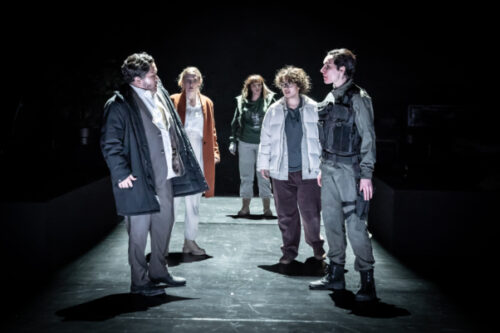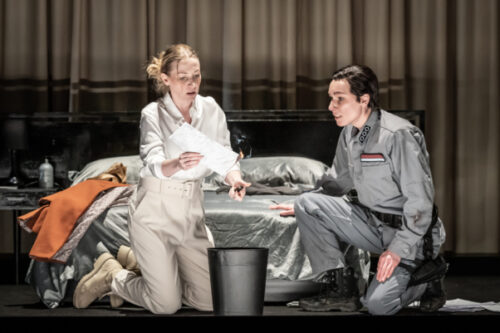 United Kingdom Handel, Arminio, HWV 36 (1737): Soloists, Early Opera Company / André Callegaro (conductor). Linbury Theatre, Royal Opera House, Covent Garden, 20.4.2023. (CC)
United Kingdom Handel, Arminio, HWV 36 (1737): Soloists, Early Opera Company / André Callegaro (conductor). Linbury Theatre, Royal Opera House, Covent Garden, 20.4.2023. (CC)

Production:
Director – Mathilda du Tillieul McNicol
Set and Costume designer – Noemi Daboczi
Lighting – D.M. Wood
Sound designer – Florence Hand
Movement director – Sacha Plaige
Fight director / Actor – Rich Gittins
Cast:
Arminio – Gabriele Kupšytė
Tusnelda – Sarah Dufresne
Segeste – Josef Jeongmeen Ahn
Varo – Michael Gibson
Sigismondo – Isabelle Peters
Ramise – Kamilla Dunstan
Tullio – Kamohelo Tsotetsi
Segismero / Roman Soldier – Rich Gittins
Handel’s opera Arminio was first staged at Covent Garden in 1737; in its 2023 incarnation, it is well-served in a performance by the Jette Parker Young Artists. One of the lesser known of Handel’s operas, its neglect only served to add a patina of fresh discovery over the entire performance: the enthusiasm of youth, perhaps. Certainly Brazilian-German Jette Parker conductor André Callegaro, making his UK conducting debut, inspired the English Opera Company to great heights, with idiomatic phrasing and superb ensemble (and some fabulous obbligato contributions). The vast majority of the time, singers and orchestra seemed glued together, and so it should be.
Composed in the same year as Giustino and Berenice (the latter heard in the Linbury in April 2019); Arminio is a strong opera in its consistency of invention. Only recordings dominate the catalogue (Alan Curtis/Il Complesso Barocco, George Petrou/Armonio Atenea and Lawrence Cummngs/ FestspielOrchester Göttingen). There should be more. This is not an opera of standout arias ripe for a highlights disc or popular classical music radio station snippetry: its strength is in its sense of through-composed excellence, with a consistent standard of inspiration. It was written quickly, true, and the seventeenth-century public was less than enthusiastic (it only survived six performances); but that does not mean we can dismiss it. Especially given a performance of utter concentration such as the Jette Parker Young Artists provided.
The setting, in Mathilda du Tillieul McNicol’s vision, is modern-day military as opposed to the proscribed Lower Saxony and North Rhine-Westphalia, Germany, in 9AD. The Royal Opera website offers a synopsis: ‘Germanian chieftain Arminio plans to repel a Roman invasion of his country, alongside his wife Tusnelda, and sister Ramise. Family, love and duty to country are tested in this brilliantly scored opera’. Varo is in love with Tusnelda (Arminio’s wife). Sigismondo, a Germanian royal and son of Segeste, is in love with Ramise (Arminio’s sister). It is Arminio’s father-in-law Segeste that has Arminio arrested, frictions abound, explored forensically by Handel and his librettist, Antonio Salvi.
We begin with two sets of closed curtains, as if one is in a hospital and they conceal beds and patients; they provide an ideal way of moving ‘location’ according to plot. Set and costume designer Noemi Daboczi’s vision and execution are superb. Behind one curtain is an office where the machinations of war take place; the other is a bedroom wherein Arminio awaits sentencing and death. Both are modern-day design. Lighting was consistently imaginative (D.M. Wood, who was likewise impressive in Oliver Mears’s production of Britten’s The Rape of Lucretia in the Linbury).

The cast was almost uniformly superb. In the title role, Lithuanian mezzo-soprano Gabriele Kupšytė, who joined the Jette Parker scheme in 2022/23 (she was Kate Pinkerton in The Royal Opera’s 2022 Butterfly). Now firmly in the spotlight (Kate is a small role), she blossomed as the rebel leader. There is much to be explored in this role, and Kupšytė seemed to live it from first to last; we felt for her misery. The aria ‘Duri lacci!’ was a case in point, the instrumental ensemble only underlining the raw emotions; even more straight to the heart was the second act farewell aria ’Vado a morir’, one of those intense, sadness-drenched or soul-shredding moments Handel consistently does so well. It was the instrumental ensemble that set the scene for the final act ‘Fier teatro di morte’ with accents of jagged glass; and Kupšytė did not disappoint. She was ideally complemented in the cast by Canadian soprano Sarah Dufresne as Arminio’s wife, Tusnelda (a Germanian royal, and Segeste’s daughter). Dufresne has been very active in the big house recently, as well as appearing in that Britten Lucretia (Shepherd boy in Tannhäuser; Barbarina in Figaro and I described her Papagena in Die Zauberflöte as a ‘beam of comedic light’). She is outstanding here – no sense of finding her own feet, this is a complete assumption of the role, the moments she veers towards suicide compelling. Dufresne can clearly do tragedy as well as she can comedy.
As a Germanian collaborating with the Romans, the character of Segeste offers many opportunities. The Korean baritone Josef Jeongmeen Ahn offered a fearsome stage presence coupled with clear and focused delivery (more bass than baritone sometimes). I enjoyed his Yamadori (Butterfly) in September last year, but with much, much more to do here the enjoyment was multiplied accordingly. Firm of pitch, vocally agile and commanding, his is another name to add to the list to keep an eye on. Mezzo-soprano Kamilla Dunstan’s Ramise (daughter of Segismero and involved with Sigismondo) was brilliantly done. This was my first experience of Dunstan, and I hope for more (I note she is also a very un-Handelian Wagner Stipendium awardee of Bayreuth’s Richard Wagner Scholarship Foundation).
If I found tenor Michael Gibson warming in somewhat to the part of Varo, as the evening progressed there seemed to be a core of steel to his voice. Isabelle Peters, an ENO Harewood Artist, took the role of Sigismondo brilliantly – her transformation to male was a triumph (Noemi Daboczi’s costuming a major contributing factor), her acting as involved as her singing.
There is talent aplenty onstage for this production – names that will grace main stages both in this building and abroad. A most satisfying and enriching evening. The real star remains Handel, of course, and perhaps most importantly, may this production of Arminio spawn many others.
Colin Clarke
